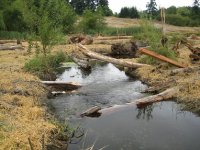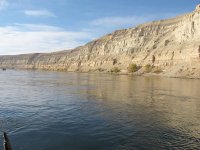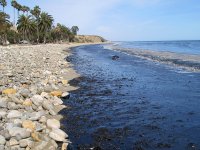Plan to Restore Endangered Terns on Ram Island, Buzzards Bay
March 28, 2024
State and federal Trustee agencies have released the Final Restoration Plan and Environmental Assessment (PDF, 88 pages) to restore bird and shoreline habitat resources in Buzzards Bay impacted by the 2003 Bouchard Barge 120 oil spill.
Ram Island roseate and common terns were severely impacted by heavy oiling and subsequent cleanup activities resulting from the spill. More than $19 million in damages were awarded through multiple settlements with responsible parties–more than $5 million of which was designated to restore the injuries to Ram Island shoreline and terns.
The Trustees will provide $5.53 million (plus accrued interest) to fund the design and construction of features to increase the island’s resilience and long-term sustainability as a critically important nesting location for terns and other seabirds. Habitat will be enhanced by increasing elevations of the interior island, restoring and expanding salt marsh and other intertidal habitat, and shoreline protection measures to mitigate further wave scour and erosion.
“The B-120 oil spill had a profound impact on the people and natural resources of Buzzards Bay. With the help of our co-trustees and numerous partner organizations, we have implemented dozens of projects to restore birds, fish, shoreline and aquatic habitats, and public uses that were impacted by the spill,” said Audrey Mayer, Supervisor of the U.S. Fish and Wildlife Service’s New England Field Office. “The Service is pleased to initiate this final phase of restoration, which will directly put back what was lost at Ram Island and recover a vital nesting site in Massachusetts for endangered roseate terns and common terns.”
Ram Island is a flat, low-lying, three-acre island located less than a mile from the mainland in Mattapoisett, MA. The island is a state-designated wildlife sanctuary, providing critical nesting habitat for both the federally endangered roseate tern and common tern, a species of special concern for the state. Each spring and summer, Ram Island supports one of the three largest nesting colonies of roseate terns in North America. The shallow water habitats around the island, including eelgrass beds and boulder fields, provide essential fish habitat for species such as striped bass, tautog, and Atlantic cod. Increasingly frequent and severe coastal storms and sea-level rise have eroded and reduced the island's size, negatively affecting nesting terns and aquatic life using the nearby waters.
The National Oceanic and Atmospheric Administration (NOAA), the U.S. Department of the Interior (DOI) acting through the U.S. Fish and Wildlife Service (U.S FWS), the Secretary of Energy and Environmental Affairs of the Commonwealth of Massachusetts (EEA), and the State of Rhode Island serve as the Natural Resource Trustees for the Bouchard B-120 Oil Spill. The Trustees will use funds to implement the Ram Island restoration in 2025-2026.
For more information and to stay in the know, sign up for DARRP’s Coastal Recovery news.






